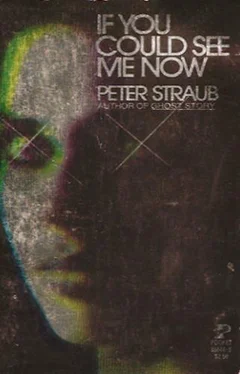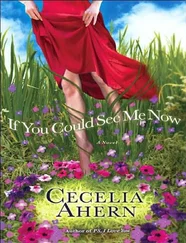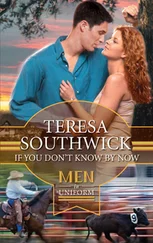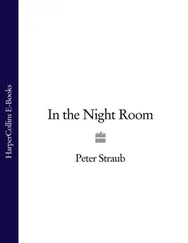Tuta Sunderson peeked at me from the corners of her eyes where she knelt before a pail of water as I went wordlessly by. Understandably, she looked as though she expected me to aim a kick at her backside. “Oh, a letter came for you,” she tittered. “I forgot to tell you before.” She gestured weakly toward a glass-fronted chest and I snatched up the envelope as I went out.
My name was written in a flowing hand on the creamy outside of the envelope. After I got into the baking interior of the VW I ripped open the letter. I pulled out a sheet of stationery. I turned it over. Confused, I turned it over again. It was blank. I groaned. When I grabbed the envelope up from the floor of the car I saw that it bore no return address, and had been posted the night before in Arden.
I shot backwards out of the driveway, not really caring if another vehicle were coming. At the sound of my tires squealing, Duane far off in the field turned his head. I sped away as if from a murder, the blank page and envelope lying on the seat beside me. The car’s engine began to sputter, lights flashed as if the hand of Spirit had momentarily thrust in and touched them; by instinct I looked up across the fields to the woods. No one stood there. No figure not a hunter but a wolf. If it was a trick, a worthless joke, who? An old enemy in Arden? I wasn’t sure I still had any, but I hadn’t expected Andy’s wife still to carry hostility toward me like a raised knife. If a sign, of what? Of some future message? I grabbed the envelope again and held it clamped to the wheel with both hands. “Damn,” I muttered, and dropped it back on the other seat as I floored the accelerator.
It was from this moment that all began to go wrong, askew. My mistake with Tuta Sunderson, the maddening letter — perhaps I would have acted more rationally if the threatening scene in the Plainview diner had never occurred Yet I think I knew what I was going to do in Arden long before it was a conscious thought. My old response to stress. And I thought I might know the handwriting on that envelope.
Speeding, I recklessly zoomed up the twisting hilly road to Arden. I nearly forced a tractor off the road. Bunny Is Good Bread; Surge Milking Machines; This Is Holsum Country; Nutrea Feeds; Highway 93; DeKalb Corn (orange words on green wings); Broiler Days: the billboards and roadsigns flashed by. At the crest of the long hill where the road opens into a view like that in Italian paintings, endless green and varied distance dotted with white buildings and thick random groups of trees, a tall sign with a painted thermometer and pointer announced that the goal of the Arden Community Chest was $4,500. I switched on the radio and heard the hollow, spurious voice of Michael Moose. “… report no progress in the shocking—” I turned the dial and let loud rock music assail me because I hated it.
An area of frame Andy Hardy houses, the R-D-N Motel, and I was going down Main Street, past the high school, where Arden lay at the bottom of the last hill. Pigeons were circling over the brick fortress of the courthouse and town hall, and in the odd quiet of the moment I could hear their wings beating after I had swung into a parking space before the Coast To Coast Store and shut off the motor. Wingbeats filled and agitated the air like drumming; when I got out of the car I saw that the birds had wheeled away from the courthouse-town hall and bannered out over Main Street. Apart from an old man sitting on the steps to Freebo’s Bar, they were the only visible living things. A tin sign clacked and banged somewhere behind me. It was as though some evil visitation had drawn everyone in Arden inside behind locked doors.
I went into the store and picked up enough groceries for a week; the two women in the aisle looked at me oddly, and would not meet my eye. The atmosphere in the grocery seemed almost ostentatiously hostile, almost theatrical — those women glanced at me, then quickly lowered their eyes, then pierced me with covert glances from the sides of their eyes. Who are you and what are you doing here ? It was as though they had spoken. I counted my money down onto the counter and went hurriedly back outside and locked the grocery bags in the VW. I had to get a bottle of whiskey.
Down the street, just passing the corner of the Annex Hotel and the Angler’s Bar, walking toward me with his hunched bustling walk, accompanied by his sour-looking wife, was Pastor Bertilsson. He was my least favorite clergyman. He had not yet seen me. I looked around in panic. Across the street was a two-story building labeled Zumgo, a name I recalled having heard before. It was where Duane had said Paul Kant was working. I turned my back on the Bertilssons and hurried across the street.
Unlike the Plainview diner, Zumgo’s had resisted any efforts to bring it up to date, and my first response was to relish the oldfashioned fittings of the store — change was sent, enclosed in metal cylinders, racketing down on wires from an office suspended below the ceiling, the counters were wooden, the floors of boards worn smooth and sent rippling by time. A moment afterwards I noticed the threadbare, depressed look of the place: most of the tables were only scantily covered by goods, and the salesladies — even now staring at me with displeasure — were aged shabby horrors with rouge enameling their cheeks. A few overweight women desultorily picked at underwear strewn across a table. I could not imagine Paul Kant at work in such a place.
The woman I approached seemed to share my attitude. She drew her lips back over false teeth and smiled. “Paul? You a friend of Paul’s?”
“I just said, where is he working? I want to see him.”
“Well, he isn’t working. Are you a friend of his?”
“You mean he doesn’t work here?”
“When he’s in he does, I guess. He’s home sick. Least that’s what he told Miss Nord. Said he couldn’t come in today. Looks funny, I think. You a friend of his?”
“Yes. I used to be, at least.”
For some reason, this caused her canine, hungry interest in me to become merriment. She gave me a glimpse of her plastic-coated gums and called to another woman behind the counter. “He’s a friend of Paul’s. Says he doesn’t know where he is.” The other woman joined her laughter. “A friend of Paul’s?”
“Christ,” I muttered, turning away. I went back to ask, “Do you know if he will be in tomorrow?” and got only malicious staring eyes for my answer. I noticed that two or three of the customers were staring at me. Auntie Rinn’s advice came back to me. Certainly some of the women seemed to resent the presence of a stranger.
Baffled, still angry, I paced around the store until even the first old woman had ceased to giggle and gossip about me with her partner. I had a purpose I did not then wish to admit to myself. I examined unspeakable clothing; I regarded sad toys and dusty envelopes and yards of material best suited to the backs of horses. The old response to stress became conscious: I took a five-dollar bill and folded it into my palm.
I was helpless before my own advice to get out .
On the second floor I spun a rack of paperback books. One of the jackets and titles snagged my attention. My Ph.D. supervisor, a famous scholar, had written it. It was Maccabee’s most popular book, The Enchanted Dream . Actually a mechanical treatise on nineteenth-century poets, it had been tricked out with a jazzy cover showing a long-haired young man apparently inhaling an illegal substance while a slightly less beautiful nude maiden coiled lambent legs and tendrils of hair about him. Unable to control the impulse which was my purpose — I hadn’t thought of such amazing luck — I took the book off the rack and slid it into my jacket pocket. It had been Maccabee who had suggested I write on Lawrence. Then I turned cautiously around (when it was too late for caution) and saw that no one had witnessed my theft. My chest thumped with relief; the book hung unobtrusively in my pocket. I twitched the pocket flap up over the top of the book. When I passed the cash register I dropped the bill on the counter and continued out onto the street.
Читать дальше












